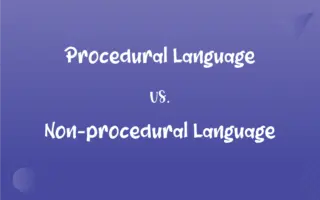Common Stock vs. Treasury Stock: What's the Difference?
Edited by Aimie Carlson || By Janet White || Published on February 6, 2024
Common stock represents ownership in a company with voting rights and dividends, while treasury stock is a corporation's own previously issued stock repurchased from shareholders.

Key Differences
Common stock signifies ownership in a company and usually comes with voting rights. Treasury stock, being repurchased by the company, carries no ownership rights or voting powers.
Common stock's value fluctuates based on market conditions, reflecting company performance. Treasury stock, once repurchased, is held by the company, and its market value is not publicly traded.
Holders of common stock are typically entitled to receive dividends. Treasury stock, however, does not entitle the company to dividends as it holds these shares in its own treasury.
Issuing common stock can increase a company's equity and capital. Treasury stock reduces shareholder equity, as it represents a buyback of the company's own shares.
Common stock is represented on the balance sheet under shareholder equity. Treasury stock is also listed under equity but as a contra equity account, reducing total equity.
ADVERTISEMENT
Comparison Chart
Ownership Rights
Yes, represents ownership
No ownership rights
Voting Rights
Typically has voting rights
No voting rights
Market Trading
Actively traded on stock markets
Not traded; held by the company
Dividend Eligibility
Eligible for dividends
Not eligible for dividends
Impact on Equity
Increases shareholder equity
Reduces shareholder equity
ADVERTISEMENT
Common Stock and Treasury Stock Definitions
Common Stock
Stock that constitutes a company's basic ownership interest.
Shareholders with common stock will receive dividends after preferred shareholders.
Treasury Stock
Shares repurchased by a company, reducing the amount of outstanding stock.
To boost the stock price, the company decided to purchase treasury stock.
Common Stock
The most common form of stock in a corporation, with rights to vote and receive dividends.
The annual meeting allowed common stock holders to vote on the board of directors.
Treasury Stock
A corporate buyback of its own shares, often to control ownership and boost market price.
The board authorized a new round of treasury stock purchases.
Common Stock
A form of corporate equity ownership, typically with lower priority in bankruptcy.
The company issued more common stock to raise additional capital.
Treasury Stock
Stock that a company has issued and later repurchased from shareholders.
The corporation's treasury stock increased after it bought back shares.
Common Stock
Equity ownership in a corporation, with voting rights and dividend eligibility.
He purchased common stock in the company, gaining a say in corporate decisions.
Treasury Stock
Previously issued stock that is bought back and held by the issuing company.
The treasury stock was accounted for as a deduction from the total issued stock.
Common Stock
Shares representing a portion of a company's capital, entitling holders to a share of profits.
The investor's portfolio is heavily weighted in technology sector common stocks.
Treasury Stock
Stock held in a company's treasury, often used for employee compensation plans.
The company used treasury stock for its executive stock option plan.
FAQs
Can common stockholders vote in corporate decisions?
Yes, common stock usually grants voting rights in company matters.
Does treasury stock have voting rights?
No, treasury stock does not have voting rights or dividend eligibility.
What happens to treasury stock in the market?
Treasury stock is not traded in the market; it's held by the company.
What does common stock represent?
It represents partial ownership in a corporation with potential voting rights and dividends.
Are dividends guaranteed for common stock?
Dividends are not guaranteed; they depend on company profitability and policy.
How does common stock affect a company's capital?
Issuing common stock raises capital by selling ownership shares to the public.
Can common stock be converted into other types of shares?
In some cases, common stock may be convertible into preferred stock.
What is treasury stock?
Treasury stock is shares that a company has issued and then repurchased from investors.
Why do companies buy back stock for treasury stock?
Companies may buy back stock to control ownership, support share price, or use for employee compensation.
Is treasury stock listed on financial statements?
Yes, it's listed as a contra equity account on the balance sheet.
Can treasury stock be reissued or sold?
Yes, companies can reissue or sell treasury stock for various purposes.
Can treasury stock be used for mergers and acquisitions?
Yes, it can be used as a tool in corporate mergers and acquisitions.
Do common stocks have a fixed value?
No, the value of common stocks fluctuates with market conditions.
How is common stock typically acquired?
It's acquired through stock exchanges or initial public offerings (IPOs).
Why might a company choose to increase its treasury stock?
To reduce outstanding shares, increase earnings per share, or prevent takeovers.
How does common stock affect a company's ownership structure?
Issuing common stock can dilute existing ownership but expands the shareholder base.
Is treasury stock considered an asset?
No, it's a contra equity account, not an asset on the company's balance sheet.
How does treasury stock impact shareholder equity?
It reduces total shareholder equity, as it's a repurchase of outstanding shares.
What rights do common stockholders have in bankruptcy?
They have lower priority compared to creditors and preferred shareholders.
Are there different classes of common stock?
Some companies issue different classes of common stock with varied voting rights.
About Author
Written by
Janet WhiteJanet White has been an esteemed writer and blogger for Difference Wiki. Holding a Master's degree in Science and Medical Journalism from the prestigious Boston University, she has consistently demonstrated her expertise and passion for her field. When she's not immersed in her work, Janet relishes her time exercising, delving into a good book, and cherishing moments with friends and family.
Edited by
Aimie CarlsonAimie Carlson, holding a master's degree in English literature, is a fervent English language enthusiast. She lends her writing talents to Difference Wiki, a prominent website that specializes in comparisons, offering readers insightful analyses that both captivate and inform.







































































